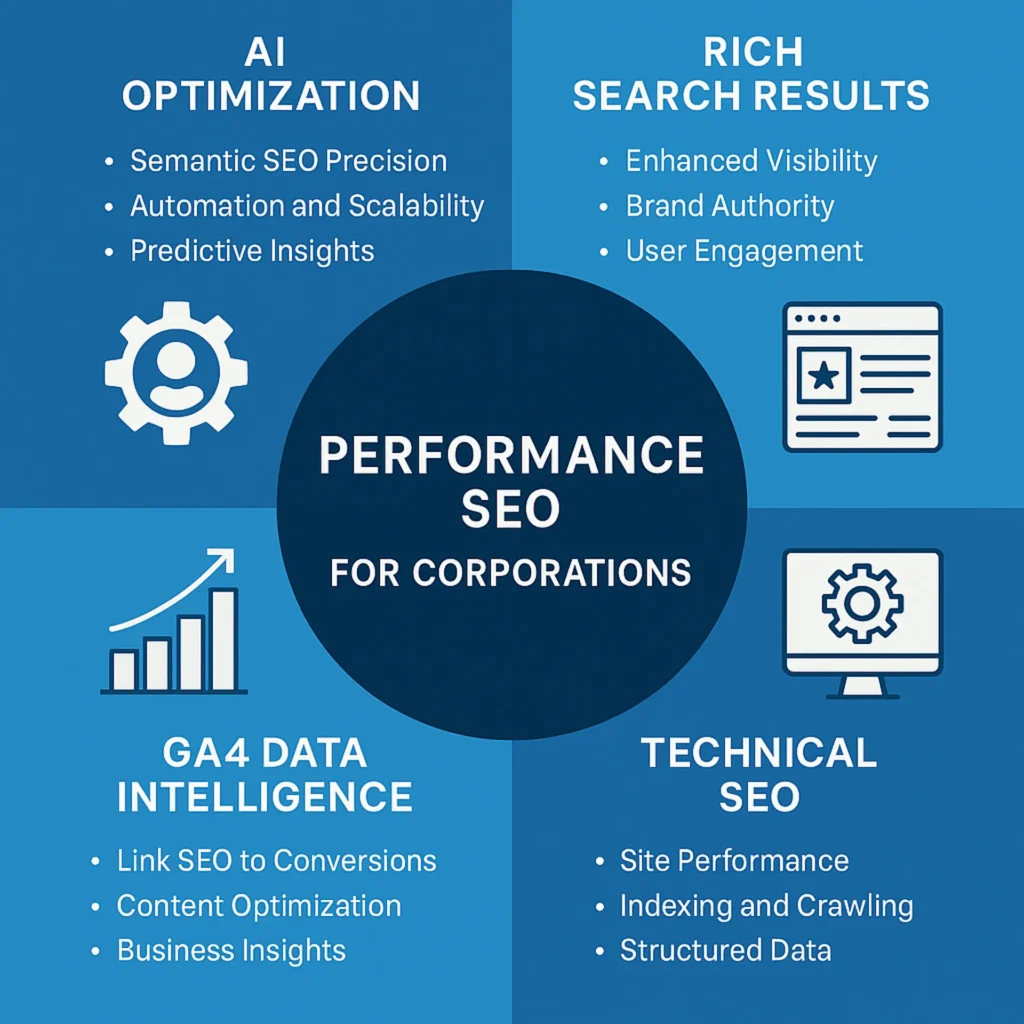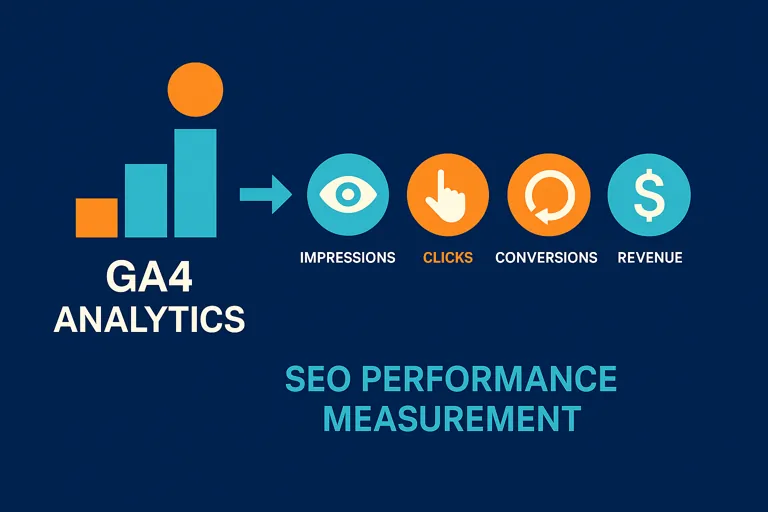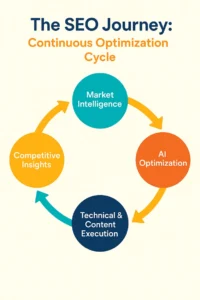Performance SEO for Corporations:
- Home
- Performance SEO
Table of Contents
Building Online Visibility, Brand Recognition, and Revenue Growth
In the era of data-driven marketing, Performance SEO represents a strategic evolution of search optimization—transforming it from a technical marketing function into a growth engine fueled by analytics, artificial intelligence (AI), and market intelligence. This article explores how corporations can leverage Performance SEO to strengthen brand visibility, drive qualified leads, and maximize marketing ROI. It also discusses why enterprise-level SEO initiatives must integrate advanced data analytics, particularly Google Analytics 4 (GA4), to inform strategic decision-making and continuously optimize digital performance.

SEO as a Core Corporate Growth Driver
In today’s digital-first economy, corporate competitiveness hinges on visibility in search engines. SEO is not merely an auxiliary marketing tactic—it is the foundation of sustainable online growth and brand authority. Organizations that fail to invest strategically in SEO risk invisibility in the discovery stage of the customer journey, where 68–75% of B2B buying decisions begin through search queries.
Corporate SEO must evolve beyond basic keyword ranking toward a performance-driven framework, where every SEO initiative is tied to measurable business outcomes such as lead generation, sales, and customer retention.
The Concept of Performance SEO
Performance SEO is a data-intelligent, systematic approach that aligns SEO initiatives with measurable business performance. It integrates advanced analytics, market intelligence, and AI-driven insights to continuously refine content, technical infrastructure, and user engagement.
This method goes beyond traffic acquisition—it evaluates revenue contribution, lead quality, and conversion efficiency. Through GA4 and data visualization tools, SEO professionals can map the complete customer journey, identify content gaps, and reveal optimization opportunities that directly impact profitability.

The Imperative of AI Optimization in SEO
AI has revolutionized SEO, turning data into predictive and prescriptive intelligence. AI-driven SEO systems—ranging from natural language processing tools for content optimization to machine learning algorithms for ranking prediction—enable marketers to act proactively rather than reactively.
Websites today should optimize their content for AI-driven systems because artificial intelligence now plays a decisive role in how information is discovered and presented online. Modern search engines, chatbots, and generative AI tools use large language models to interpret and summarize web content for users. To appear in these AI-driven summaries and recommendations, a website’s content must be clear, contextually rich, and semantically structured. Using schema markup, natural language clarity, and entity-based organization helps AI systems accurately understand what a brand, product, or service represents—making that content more likely to be cited or surfaced in AI-generated results.
Optimizing for AI also directly supports SEO performance. Search algorithms like Google’s RankBrain, BERT, and MUM all rely on machine learning to evaluate meaning, context, and authority rather than simple keyword matches. When content is written and structured for AI comprehension, it naturally aligns with these models’ ranking logic—improving semantic relevance and enhancing a site’s authority in search results.
The relationship between AI and SEO is therefore mutually reinforcing. SEO provides the structured data and technical clarity that AI systems depend on, while AI-driven analysis helps refine SEO strategies with predictive insights and automation. Together, they form a continuous loop of improvement—helping websites build stronger topical authority, dominate search ecosystems, and maintain long-term digital visibility and brand trust.
In an environment where Google’s search algorithms evolve dynamically, AI integration is no longer optional—it is essential for maintaining competitiveness and adaptability.
Why SEO Is Indispensable to Corporate Marketing Strategy
SEO forms the connective tissue between content marketing, paid media, social engagement, and conversion optimization. Without SEO:
- Businesses lose organic visibility—the most credible and sustainable traffic source.
- Paid campaigns face higher acquisition costs due to weak organic trust.
- Brand recognition suffers as competitors dominate search exposure.
Incorporating SEO into corporate marketing strategies ensures consistent visibility across all digital touchpoints, magnifies ROI across paid media, and reinforces brand authority.
SEO for Lead Generation and B2B Growth
For corporations dependent on lead generation, SEO is not an option—it is a necessity. SEO enables:
- High-intent lead capture through organic search.
- Content-driven qualification, where prospects educate themselves through blogs, case studies, and product pages.
- Conversion alignment, using SEO data to refine messaging and landing page design.
In B2B contexts, where purchase decisions are research-intensive, ranking for informational and commercial-intent queries positions corporations as thought leaders early in the buyer’s journey.
Critical SEO Skills for Corporate Competitiveness
A corporate SEO expert must bring a high-caliber skillset that integrates technology, analytics, and strategy. It includes:
- Technical SEO – Optimizing site architecture, indexing, Core Web Vitals, and crawl efficiency.
- Content Strategy & Optimization – Crafting search-intent aligned content that builds topical authority.
- GA4 Data Intelligence – Linking SEO outcomes with engagement and conversion metrics.
- Competitive Research – Using AI-driven tools to analyze competitors’ strengths, backlink profiles, and keyword gaps.
- Schema & Structured Data Implementation – Enhancing visibility in rich search results and SERP features.
- Link Building & Digital PR – Strengthening authority through credible mentions and quality backlinks.
- Performance Tracking & Reporting – Leveraging dashboards to visualize SEO’s revenue impact.
Achieving Rich Search Results: The Modern SEO Goal
One of the most significant advancements in search engine optimization is the emergence of rich search results, also known as enhanced search listings. These results—such as featured snippets, knowledge panels, FAQs, product reviews, and event listings—visually dominate search engine results pages (SERPs), providing users with immediate, contextualized information.
For corporations, achieving rich results is a critical SEO objective because:
- Enhanced visibility:
 Rich results occupy premium positions, increasing click-through rates (CTR) by up to 30–40%.
Rich results occupy premium positions, increasing click-through rates (CTR) by up to 30–40%. - Brand authority: Being displayed in structured, knowledge-rich panels enhances corporate trust and perceived expertise.
- User engagement: Rich snippets deliver relevant answers quickly, improving user satisfaction and time-on-site.
- Conversion optimization: Structured data aligns SEO efforts with transactional or informational intent, guiding users toward desired actions.
Implementing schema markup is therefore essential. It allows search engines to better understand and categorize corporate content—facilitating eligibility for rich results and other SERP features. As a key goal within Performance SEO, rich search results represent the intersection of technical precision, content relevance, and data-driven visibility
Social Media Synergy: LinkedIn and Beyond
Corporate SEO does not operate in isolation. Social media presence—especially on LinkedIn—amplifies SEO results through:
- Increased brand mentions and backlinks.
- Engagement signals that support E-E-A-T (Experience, Expertise, Authoritativeness, Trustworthiness).
- Audience targeting synergy for remarketing and brand reinforcement.
A well-optimized LinkedIn page, regularly publishing thought leadership content, not only strengthens brand credibility but also contributes to off-page SEO performance.
The Role of SEO-Optimized Landing Pages in Paid Media
SEO and paid campaigns are interdependent. Optimized landing pages:
- Enhance Quality Score in Google Ads, reducing CPC and improving ad efficiency.
- Increase conversion rates through relevance, faster loading, and user intent alignment.
- Improve remarketing performance, as GA4 tracks user paths between organic and paid sessions, providing holistic performance visibility.
Thus, Performance SEO ensures paid and organic media work in harmony to maximize ROI.
The Growth of Search and Its Implications for B2B
Global search engine usage continues to surge, with Google processing over 8.5 billion searches daily. For B2B organizations, this trend signifies that potential clients are researching suppliers, partners, and services online—long before contacting sales teams.
Search visibility, therefore, directly correlates with business opportunity. Ranking for high-intent B2B keywords builds credibility, drives qualified inquiries, and shortens sales cycles.
Multi-Location SEO and the Role of Google Business Profile
For multi-location corporations, a well-structured Google Business Profile (GBP) is critical for local and regional SEO. GBP listings:
- Strengthen local visibility in “near me” and map-based searches.
- Provide social proof via reviews and ratings.
- Enhance on-page SEO by reinforcing location-based signals and NAP (Name, Address, Phone) consistency.
GBP also integrates with UTM-tagged GA4 data, allowing corporations to measure and optimize local engagement performance effectively.
Technical SEO and Performance-Driven Ranking
Search engines now evaluate user experience as a ranking factor. Google’s Core Web Vitals—page speed, interactivity, and stability—directly influence visibility. Corporate websites must invest in:
- Server-side optimization.
- Mobile-first indexing.
- HTTPS and secure data architecture.
- Structured data and canonicalization for rich result eligibility.
Technical SEO underpins every successful digital strategy—without it, even superior content remains invisible.
SEO as a Continuous Journey
 SEO is not a one-time project; it is an evolving journey in an environment that constantly changes. Algorithms update, competitors optimize, and user behaviors shift. Maintaining leadership requires:
SEO is not a one-time project; it is an evolving journey in an environment that constantly changes. Algorithms update, competitors optimize, and user behaviors shift. Maintaining leadership requires:
- Ongoing content enhancement.
- Regular technical audits.
- Continuous competitor benchmarking.
- Performance-driven experimentation guided by GA4 and AI insights.
The corporations that treat SEO as a perpetual optimization process—not a static initiative—are the ones that consistently dominate their industries online.
The Case for Data-Driven Corporate SEO Leadership
Performance SEO represents the future of corporate growth—anchored in analytics, powered by AI, and measured by outcomes. It is no longer sufficient to “do SEO”; corporations must master it strategically, integrating it into their organizational DNA.
Achieving rich search results, optimizing for AI-driven SERPs, and leveraging GA4 insights are now non-negotiable pillars of digital competitiveness. Hiring a high-level SEO expert with GA4 proficiency is not a marketing luxury—it is a business necessity.
In an economy where visibility equals viability, data-driven SEO leadership is the competitive advantage that separates growth leaders from laggards.

 Rich results occupy premium positions, increasing click-through rates (CTR) by up to 30–40%.
Rich results occupy premium positions, increasing click-through rates (CTR) by up to 30–40%.